At the risk of agitating reader Brad, who already calls me “old and cranky,” let me tell you about a nostalgic email that I got from Dean Everette, a friend and old radio hand who laughs that he, like many in that transient profession, “was fired every couple of years or so.” (I was fired twice.)
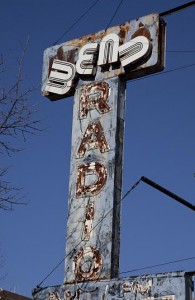
Radio is suffering because of competition from new media and satellite services. But things are not THIS bad. (Carol M. Highsmith)
His note was about some nearly forgotten jargon from American radio’s heyday in the 1950s or ’60s. They tickle fond — or in other cases nightmarish — memories for anyone who got a start as a “one-man band” — there were no one-woman bands in those days — at a tiny, 1,000-watt stations in places such as Upper Armpit, Alabama.
These folks worked from 2 p.m. to midnight, ripped-‘n’-read the news off the AP wire, spun some platters, dazzled their few hundred listeners with hip deejay lingo, cued the national anthem sign-off music, made a cursory check of the radio tower out back, then swept up the place before locking the door and going home.
While such recollections are radio-specific, anyone who’s had a sales job or worked in a specialized field that had its own buzzwords and its own long career ladder will recognize many of the memories that Dean sends along.
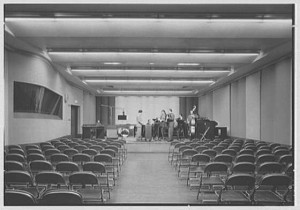
Radio was once so dominant that big-city stations had huge set-ups for large, recorded concerts, to which the public was invited. (Library of Congress)
I’ve mixed in a few musty-dusty nuggets of my own as well from my time in commercial radio. Don’t worry. I’ll define the really obscure terms in my “Wild Words” at the end.
Here goes:
You were playing Elvis’s No. 1 hits when he was still alive.
You always told your listeners “I’ll get that song on for you right away” and then didn’t.
Sixty percent or more of your wardrobe had a station logo on it.
Without thinking, you answered your home phone with the station’s call letters.
You smoked in the control room, and nobody cared.
You played practical jokes on the air without fear of lawsuits.
You were at least 10 years older than your last two GMs and 20 years older than the last two PDs who fired you.
Religious stations were locally owned, run by a fundamentalist minister, never had more than 20 listeners, but somehow still made money.
You thought normal people listened to AM (medium wave) radio and only “hippies” or rich snobs to FM.
Radio stations used to have enough on-air “talent” to field a “celebrity” softball team every summer. (UPDATE: Many stations today are almost completely automated, playing syndicated music or talk shows and employing only an engineer or two to keep the station on the air, and maybe a part-time announcer who voice-tracks local commercials and intros to the music.)
You had listeners who tuned in only for the news, and not you. (UPDATE: Nowadays, more stations don’t do news at all than carry news updates. And rarely does a staff “newsman” provide them. (“Newswoman” never caught on as a term, even when women broadcast journalists became commonplace. The disc jockeys called them “news chicks.) Most of today’s radio news comes from a national network or a central local “headline” service.
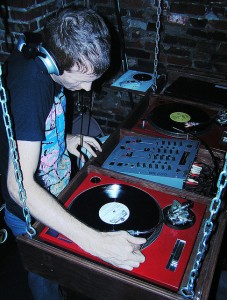
You could hit a post, run down the hall to the bathroom, and be back in 2:50 for the segue back to your show.
You could slip-cue a disc in your sleep.
You knew people who actually listened to baseball games on the radio and one fellow who used to re-create PBP broadcasts based on reports coming over the wire.
You made a meager wage but lived in a nice house, drove a hot car, and ate in the only good restaurant in town, thanks to trade deals.
You ran phone contests for which nobody called, so you made up a name and gave the tickets to your girlfriend.
You always had a small screwdriver in the studio so you could repair a fouled-up cart at a moment’s notice.
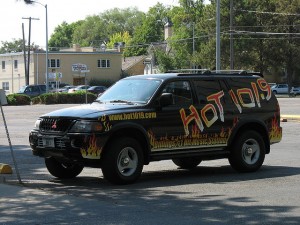
Station personalities had to meet and greet at various promotional events. The public was thrilled, but for the station, this got old fast. (maveric2003, Flickr Creative Commons)
Sales guys wore Old Spice deodorant to cover the smell of liquor. And only sales guys became general managers, which meant they could make life miserable for, or fire, the stuck-up news guys that they hated.
Maintenance engineers always had the worst body odor, not because they worked hard, but because they just didn’t shower that often.
The jocks used to fight with the news guy over airtime.
The last new guy you trained toward the end of your career had never listened to an AM station and couldn’t name one in his own home town.
That was then. This is now:
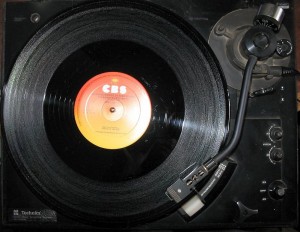
Did you know that vinyl records are back in fashion, especially among young people who have no memory of the golden days of discs? (Tomasz Sienicki, Wikipedia Commons)
You still refer to CDs as “records.”
You’ve been married at least three times or never married at all. Moving 18 times to different stations and cities in 40 years may have something to do with that.
You still have a couple of old transistor radios around the house with corroded batteries inside them. And an old reel-to-reel tape on which you recorded your first aircheck, and some other airchecks that you dubbed onto cassette tapes. But they’re unplayable because most of the oxide turned brittle and flaked off.
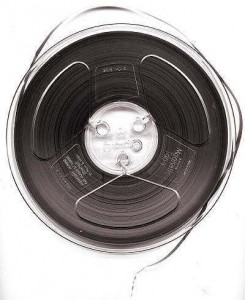
In these days of digital editing, can you imagine slicing up audio tape and splicing it together again hundreds of times per reel? (Daniel P. B. Smith, Wikipedia Commons)
In a box in the attic, you still have a white wax pencil, a splicing block, a razor blade, and a dried-out roll of 3M splicing tape (from the days when tape was “edited” by physically marking start and stop points on actual tape and then cutting the tape at a precise diagonal with an Exacto knife.).
You have at least 19 autographed pictures of yourself with famous people who passed through town. They read, “To my pal [your first name]. Keep ‘em spinning,” even though stars didn’t know you from Adam.
Remember, though, as Dean Everette reminded me: Old deejays never die. They just crossfade out.
Ted's Wild Words
These are a few words from this posting that you may not know. Each time, I'll tell you a little about them and also place them into a cumulative archive of "Ted's Wild Words" in the right-hand column of the home page. Just click on it there, and if there's another word that you'd like me to explain, just ask!
Radio jargon. Here’s a list of terms that old-time radio disc jockeys, news- and salespeople would recognize: AIRCHECK. A recording of you at your best on the air, packaged to send to possible new employers. CART. A hard-plastic cartridge containing a continuous loop of audio tape on which you recorded station “jingles,” “spots” [commercials], or news and sports interview “bites.” CROSSFADE. To ease into a song as you’re simultaneously easing out of another. DUB. A copy of an audio tape. GM. General manager. HIT A POST A post is a hard break point in a show, one that cannot be delayed, such as the beginning of a network newscast at the top of the hour. Hitting it means finishing any music or conversation in time to hear the start of the newscast or commercial cleanly at the post. PBP. Play-by-play sports broadcast. PD. Program director — the fellow (almost all were men) who supervised the on-air “talent” and often had a prominent “drivetime gig” of his own. PLATTERS. Phonograph records, also referred to as “discs,” “vinyl” or (by renowned deejay Robert “Wolfman Jack” Smith) “stax of wax.” POT IT DOWN (or up). Adjust the volume using a control knob or slider on the audio “board.” RIP-'N'-READ. Rather than writing a news story yourself, you simply ripped a story off the wire-service printer and read it on air, often “cold,” having not even looked at it. This has produced some fabulous “bloopers,” or embarrassing on-air mistakes. SEGUE. Pronounced SEGG-way, this is a transition between songs or show elements. SLIP-CUE. Pressing down on a record on a turntable to keep it from spinning and playing, then releasing it at precisely the time you want the music to start. SPOT. A commercial advertisement. Trade deal. An agreement between a station and a sponsor in which an advertiser gets sponsorship air time, but instead of paying money provides the station or its star “talent” with free goods or services. VOICE TRACK. To lay down commercials and introductions to music, sometimes for a whole day or week, in one sitting. The voice track is then edited into the appropriate spots so that, to the listener, it sounds like the disc jockey is there live, introducing each record or spot.


2 responses to “Potting It Down”
U missed the part about the radio station receptionist.
Al, who’s an old friend and former boss, knows a thing or two about radio. He’s right. I left out a part of the old-time radio rundown sent to me by Dean, having to do with comely receptionists. Let’s just say it involves a sort of rite of passage for newcomers to the biz. Young MALE newcomers. Young women were sometimes thought of, and employed, as trophy-like exhibits in those unenlightened days.
Ted